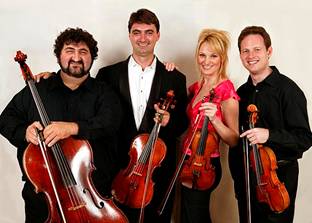CSQ SHINES IN THE RAIN
REVIEWED BY CHARLES LONBERGER
The Beverly Hills Outlook, March 10th, 2005 issue
 "Chamber
music was written for those musicians who aren’t good enough to be soloists."
Having been thus unsolicitedly informed by a Christian ignoramus at the Beverly
Hills Presbyterian Church (unfortunately, ignoramuses abound between the pews
in Churches), I settled down to watch the wonderful California String Quartet
tackle a very varied program with the rain pouring down outside.
"Chamber
music was written for those musicians who aren’t good enough to be soloists."
Having been thus unsolicitedly informed by a Christian ignoramus at the Beverly
Hills Presbyterian Church (unfortunately, ignoramuses abound between the pews
in Churches), I settled down to watch the wonderful California String Quartet
tackle a very varied program with the rain pouring down outside.
But, while I did, and while they played, I was further distracted by a painter
creating an abstract behind the group on a podium. I failed to see any interconnectedness
between his activity and theirs, save for the silent auction it would be sold
at to benefit them. I tried my best to ignore it, and listened while the Quartet
began with Haydn’s Quartet #6, which made order out of passion. Group
leader Katia Popov was playful and firm on her first violin, with a very mellow
tone making the adagio essentially sweet, although it took a turn towards anxiety,
with tension arising out of a shift to a minor key. But the Menuetto was once
again chipper before the Finale Allegro in which Popov’s First violin
and Samuel Fischer’s Second violin reinforced each other, while warily
circling each other and maintaining a respectful distance. After waving to her
fans, Ms. Popov rejoined us to take off on the rip-roaring ride that is Shostakovich’s
String Quartet #3. Propelled by Armen Ksajikian’s cello, its main melody
was sung by Popov’s strings. Violist Darrin McCann set the beat, against
which Popov nervously fiddled, in its Moderato con moto, and Fischer, McCann
and Ksajikian made musical dark clouds on its Allegro non troppo, while Popov
played an Yiddish theme. The Adagio was like wandering out after carnage, with
McCann’s viola mourning. The Moderato opened creepy, then turned mock,
and finally stridently horrific, with Popov’s violin left alone following
a twisted lyricism. The composition was a scream amongst turmoil.
The quartet returned for the final number, Borodin’s Double Cello Quintet,
in which the remarkable tone and dynamic playing of guest cellist Andrew Shulman
is to be mentioned. The tone of the ensemble itself was a wonder to hear in
this refined and conventional composition of pure harmony, although its Finale
Prestissimo was fiery as a gypsy camp flame. Unsettlingly, this movement gravitated
to the dark and dreary before snapping back to the high spirits again at its
conclusion. Taken as a whole, the musicianship all afternoon was shining and
simply soared.
 "Chamber
music was written for those musicians who aren’t good enough to be soloists."
Having been thus unsolicitedly informed by a Christian ignoramus at the Beverly
Hills Presbyterian Church (unfortunately, ignoramuses abound between the pews
in Churches), I settled down to watch the wonderful California String Quartet
tackle a very varied program with the rain pouring down outside.
"Chamber
music was written for those musicians who aren’t good enough to be soloists."
Having been thus unsolicitedly informed by a Christian ignoramus at the Beverly
Hills Presbyterian Church (unfortunately, ignoramuses abound between the pews
in Churches), I settled down to watch the wonderful California String Quartet
tackle a very varied program with the rain pouring down outside.